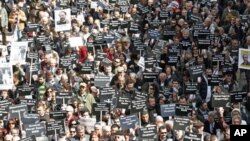Freedom House, a U.S.-based group that monitors human rights around the world says the number of people with access to free and independent media has declined to its lowest level in more than a decade. In its newly released annual survey, the group says several key countries saw significant declines last year and that only one-in-six people live in countries with a press designated as free.
In this year's annual index of global media freedom of 196 countries and territories, Freedom House says it rated 68 as "free" and the remaining two thirds as "partly free" or "not free."
Freedom House Senior Editor Karin Karlekar says this is roughly an even breakdown, but a closer look reveals a different picture. "If you look at the population statistics, they are much bleaker, only 15 percent of the world's inhabitants or one in six live in countries with a free press, while 42 percent have a partly free press and 43 percent, the majority, are in a not-free press," she said.
Karlekar made her remarks at a conference at the Newseum - a journalism history museum in Washington D.C. - to mark World Press Freedom Day. She says looking back at the three decades Freedom House has been monitoring global media freedoms, there have been considerable improvements, as well as what she says are recent worrying declines. "In terms of overall trends, what we see is, as overt control over and censorship of the print and the broadcast media have lessened, other methods of influence have been applied. And this is from legal and regulatory harassment to intimidation and outright physical attacks on journalists," she said.
The status of press freedom around the world - Courtesy of Freedom House
Freedom House says Egypt, Honduras, Hungary, Mexico, South Korea, Thailand, and Ukraine were among those countries that saw significant declines.
Violence in Mexico brought on by problems with drug trafficking and an ongoing drug war, the group says, led to a dramatic increase in attacks on journalists, rising levels of self-censorship and impunity.
The group says a severe crackdown prior to Egypt’s parliamentary elections last November saw the country’s rating slip to not free. Smaller setbacks were also seen in Iraq, Iran, Kuwait, Morocco and Yemen.
Karlekar says that recent events in the Middle East and North Africa could help reverse the global trend and bring more positive upward movement in the next survey. "We are hoping that next year, there will be more positive movement. That the movements in the Middle East and the revolutions of early 2011 give us hope that perhaps this trend of decline that we have seen in the last eight years may be coming to an end," she said.
The survey also notes that repressive governments have stepped up efforts to control new means of communication, such as satellite television, the Internet and mobile telephones.
The report says satellite television was blocked in Egypt and Iran. The social networking website Facebook was briefly blocked in Pakistan in 2010 and remained unavailable in China, Syria and Vietnam last year.
South Korea was moved from free to partly free and Thailand slipped from partly free to not free following an increase in efforts in both countries to censor online content.
U.N. investigator for freedom of opinion and expression Frank LaRue says many politicians are panicking because they believe the Internet poses a threat as a multi-active, interactive form of communication. "We find that censorship is growing again. Sometimes with old forms of criminalizing. The crime of defamation, which has been in the legislature of many countries, but dormant for a long time, is now being revived. South Korea was put under a new status in the report of Freedom House precisely because the Internet is being sanctioned, bloggers are being criticized," he said.
Freedom House says additional pressure on the media in politically turbulent Thailand led to its decline.
Karlekar says that for the most part, levels of Internet freedom and press freedom are roughly the same among good and bad performers. "In countries like China and Iran, which are very repressive, they have repressive media environments and also Internet and digital media environments. What we see, however, in the [ranking of countries and territories] is that there are significant gaps between Internet and press freedom, where the Internet provides a relatively free space in otherwise closed media environments," he said.
Karlekar says that while there are increasing attempts to restrict and limit the influence of the Internet, the medium is contributing to the opening up of intellectual freedoms and a source of potential hope for change.




